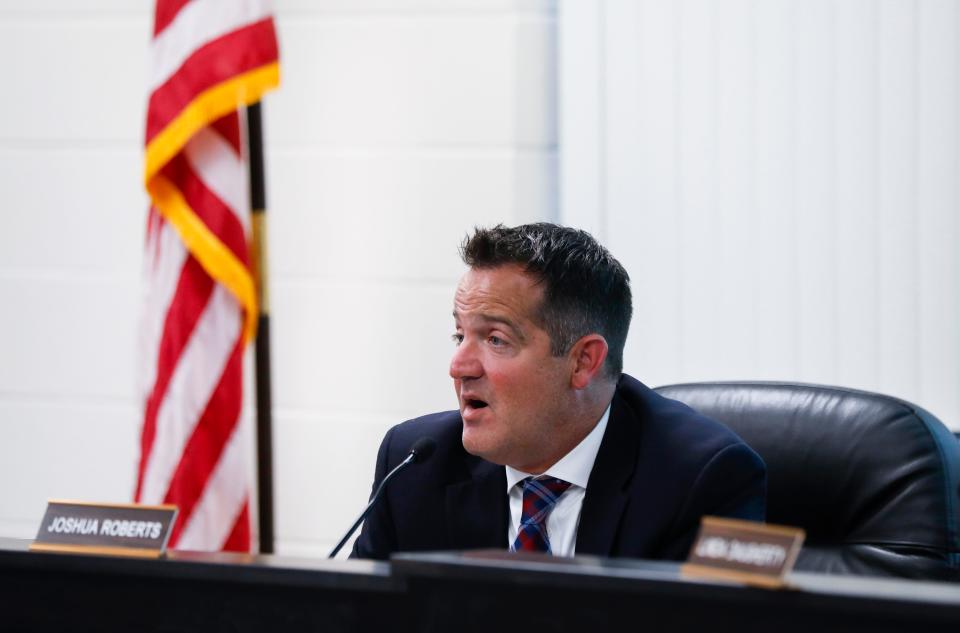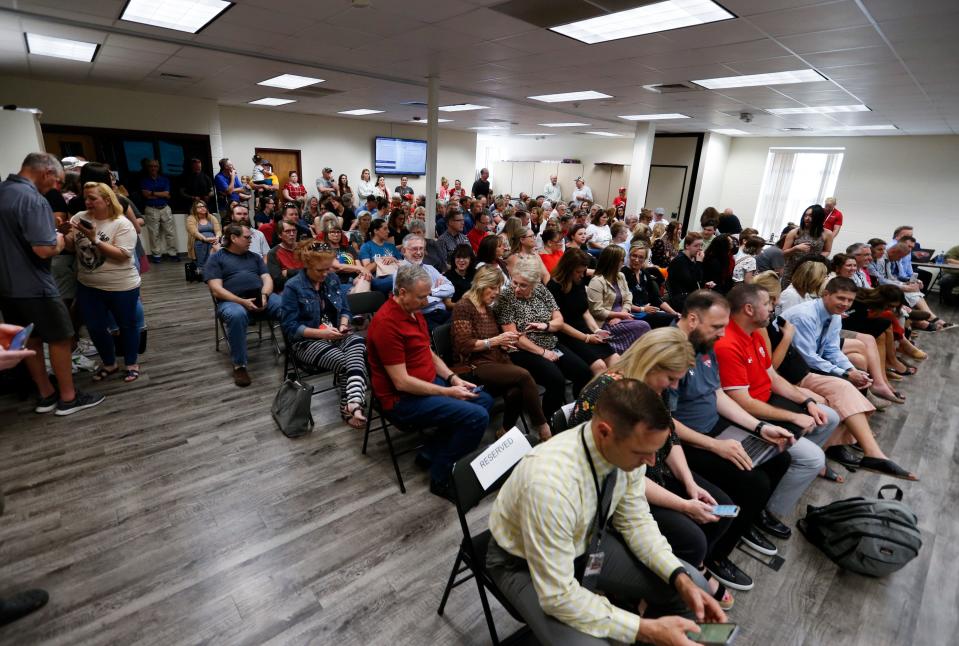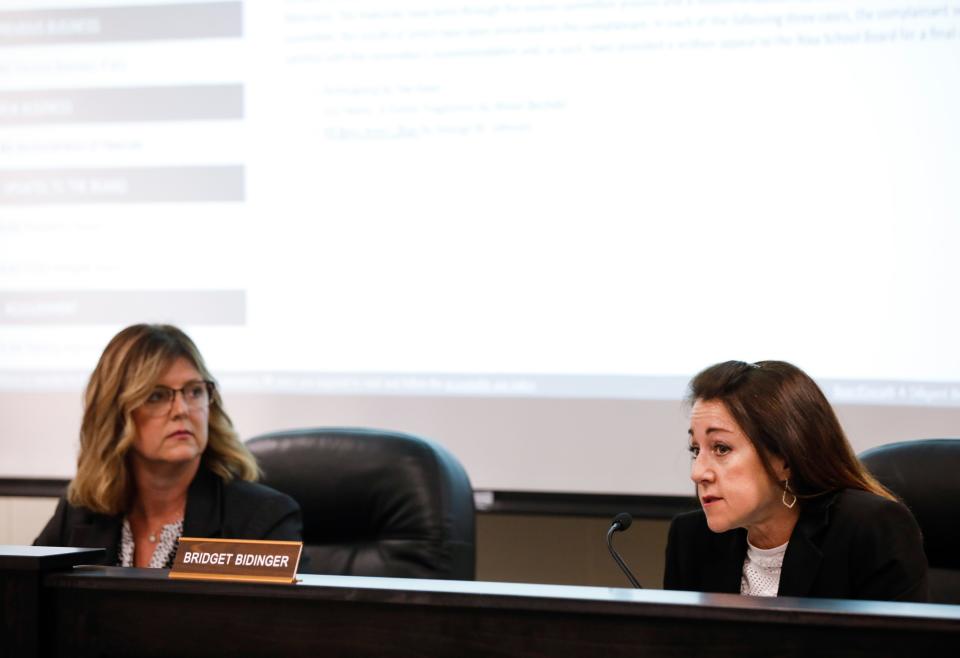Nixa school board stands firm on policy changes as parents, students debate book bans
In the end, nothing was changed.
The Nixa school board unanimously voted Thursday to reaffirm a trio of policy updates it quietly approved in late June, including one that guides how library books are selected.
This year, parents formally challenged 16 library books at Nixa High School. Review committees restricted access to nine of the books. The board restricted access to a 10th book and removed two others.
Prior to the Thursday vote, board vice president Josh Roberts read a statement to kick off the public comment period, which included comments from 20 people, including two ministers, three women who had challenged books, and six students.

In the statement, Roberts said the board was notified Sept. 10 that it had failed to publicly post the policies approved 10 weeks earlier as part of the "consent agenda," which includes proposals approved with a single vote and little or no discussion.
"We looked into and confirmed that, in fact, those documents were mistakenly not made public. The board, we could see the documents. We could access them because we were logged in with our username and passwords but the public could not," Roberts said of the BoardDocs system. "So those items were then added to the agenda of the first board meeting following discovery of the omission."
At that September meeting, speakers asked the board to postpone any final decision regarding the policies — and the accompanying regulations and administrative procedures — until the public had more time to review and comment on the documents.
Roberts said the board opted to provide all the accompanying documents to the public prior to Thursday's "revote" — even though the regulations and administrative procedures, which spell out how specific policies are implemented, do not require a board vote.
"Those were extra items that were included on the June and the September agendas in an effort for the board to be more transparent," he said. "Although it appears some of those efforts were not appreciated by certain people."
More:Nixa parents form group to fight book bans, demand school board transparency
To the standing-room-only crowd, Roberts said the board only planned to revote on the three policies. (The other two, which were not controversial, guided law enforcement interviews of students and public participation at meetings).
"We do not plan to revisit items that are squarely within the purview of administration, for that is their realm. And I anticipate tonight much discussion will be about those procedures and regulations rather than the actual board policy," said Roberts, noting updates to the selection of library materials were required by a change to state law. "And that is fine. The administration is here and they are listening."
Board members did not make additional comments related to the books or policies, even during the vote.

Lengthy public comment split between opposition, support
For nearly an hour, the board and administration listened as patrons stepped to the podium and publicly debated the rights of students and parents, the impact of restricting and removing library books, and support for students who are LGBTQ or from diverse backgrounds.
The parents who challenged books in Nixa said they contained sexually explicit passages and were not appropriate for high school. In Nixa, and across the U.S., many of the books targeted for restriction or removal deal with difficult themes including racism, assault, trauma, bullying and other experiences related to marginalized groups.
Public comments Thursday were more civil than recent meetings. There was no heckling, personal attacks or demands to fire the high school librarians.
Multiple speakers urged the board, and community, to publicly support librarians in the future.
"They are upstanding citizens who deserve just as much respect as you do. We, as students, know that all the targeted attacks toward their reputation are gross mischaracterizations," said Spencer Hadley, a student. "They have repeatedly proven themselves to be deeply concerned about student welfare over political pursuits and are highly valued by the student body."
More:Nixa High School students oppose effort to remove books from library shelves
There was also strong support for the school board and its decision to restrict or remove books this year.
Alex Bryant, a minister who was a candidate for the U.S. House to represent Missouri's 7th Congressional District until he lost in the August primary, said the board acted on behalf of most residents in Nixa "we're a conservative, mainly Christian community."
"You're talking to people in church, talking to people in the community and in schools," he told the board. "You speak for us parents and we thank you for that."

Students spoke against book banning, mixed on new policy
Alex Rapp, a senior, said the removal of books in a library that serves grades 9-12 is sending mixed messages to high school students.
"Apparently we're old enough to vote, pay taxes and drive while at the same time too young and innocent to read a book with even the slightest bit of inappropriate content," Rapp said.
He said the experiences detailed in many of the challenged books mirror the situations that Nixa teenagers encounter. He said books with diverse content can build empathy and a better understanding of others.
"We are more mature than many may think. We're able to handle subject matter that is more complex and nuanced. I have friends whose experiences are reflected in these books. I live next to these people," Rapp said. "The idea that I am too immature to care about their experiences is demeaning. This view is patronizing and strips students of their agency and self-determination during a time when it is needed the most."
Brandon Schmidly said the district's revised policies and procedures for evaluating library books are reasonable. But, he also supported students' right to speak up. All six students were against banning books.
"I support what you guys are doing and I also support students that are here. This is fantastic actually to see the civic engagement that is created by controversial issues," he said to the board. "... I applaud all that they're doing there and the teachers that have inspired them."
The comments were almost evenly split between those who supported or opposed banning books — although even the use of the term "banning" was debated.

"You need to call it like it is. This is book banning. When we look up the definition of ban it says the official or legal prohibition of an item and that is exactly what is happening with these books," said Meghana Nakkanti, a senior.
Nakkanti said if the issue was truly about parental choice then a challenge by one parent would not result in removal of a school library book from the teenagers of other parents.
She said as the demographics in Nixa become more diverse, school libraries ought to provide a wide range of options.
Nakkanti said the mission of Nixa Public Schools is to create productive, informed, confident and engaged citizens for a global society.
"This is only possible by accessing diverse literature and learning about people who are different than us," she said.
Some parents offered support for book removals, restriction
Brian Hoffman, a parent, said the board has blocked inappropriate material from being available to minors during the school hours.
"I don't want pornographic material in a library where I can't supervise my children on what it is that they're picking up and reading and learning," he said.
"What's the next thing? We're going to allow them to learn about polygamy? We're going to allow them to learn about bestiality? We're going to allow them to learn about pedophilia? Where does it stop?"

Three of the women who sought to remove the library books spoke Thursday. They included Cindy Dickens, Rebecca Kauffman and Carissa Corson.
Rather than banning, Kauffman referred to the removal as "relocating sexually explicit books." She praised the board.
"What you did was right and the decisions that you made clearly put the kids above the noise and the bias media attention that followed," she said. "Erring on the side of caution with our kids' maturing hearts and minds isn't book banning."
Corson said she hoped the revised policies and book restrictions or removals are just the beginning.
"I encourage you to make more changes to policy and procedures and regulations like this," she said.
One of the last speakers Thursday, she challenged an argument by some against book banning that "kids already have everything at their fingertips through the internet."
"In some cases, that may be true. Yet some of us go to great lengths to combat the evils of the internet through filters or blocking apps," she said. "And just because it's out there doesn't mean that we shirk from our responsibility to make a change in what we can control."
Restricted, removed books
In mid-May, in a contentious meeting, the Nixa board decided to remove two books and restrict a third.
"Fun Home: A Family Tragicomic" by Alison Bechdel. The board voted unanimously to remove this book;
"All Boys Aren't Blue: A Memoir-Manifesto" by George Matthew Johnson. Five board members voted to remove including Linda Daugherty, Bridget Bidinger, Josh Roberts, Jason Massengale and Brent Dunn. Heather Zoromski and Mike Copeland voted to retain the book with restrictions;
"Homegoing" by Yaa Gyasi. All board members except Bridget Bidinger voted to restrict the book. Bidinger voted to remove it.
This year, nine other challenged books were restricted following a committee-level review, including:
"Beyond Magenta: Transgender Teens Speak Out" by Susan Kuklin;
"Black Girl Unlimited: The Remarkable Story of a Teenage Wizard" by Echo Brown;
"Blankets" by Craig Thompson;
"Looking for Alaska" by John Green;
"Out of Darkness" by Ashley Hope Pérez;
"Bluest Eye" by Toni Morrison;
"The Glass Castle: A Memoir" by Jeannette Walls;
"The Infinite Moment of Us" by Lauren Myracle;
"The Perks of Being a Wallflower" by Stephen Chbosky.
Claudette Riley covers education for the News-Leader. Email tips or story ideas to criley@news-leader.com.
This article originally appeared on Springfield News-Leader: Book ban debate continues in Nixa as school board reaffirms policy

